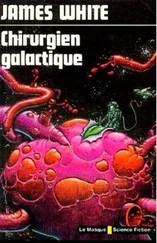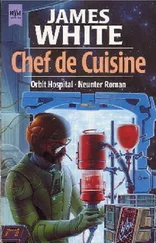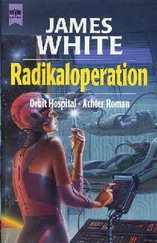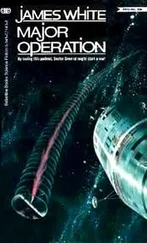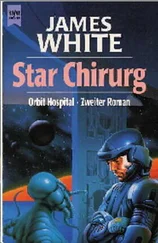There was another reason for avoiding the dining hall. In spite of the fact that his limbs no longer seemed quite so foreign to him, and the people passing him in the corridor were not nearly so unsettling as they had been before his visit to Semlic’s wards, and he felt in control of his alter egos, he was not sure that he could remain so if he were to be exposed to the proximity of masses of food which his taped entities might find nauseating.
It would not look good if he had to pay another visit to Semlic so soon. He did not think that the type of cold comfort he had received was habit-forming, but the law of diminishing returns would most certainly apply.
When he arrived Murchison was dressed, technically awake, but in a powered-down condition, and about to go on duty. They both knew, and they were careful not to mention to each other that they knew, that O’Mara had arranged their free periods to coincide as seldom as possible-the assumption being that it was sometimes better to put off a problem rather than cause unnecessary grief by trying to solve it too soon. Murchison yawned at him and wanted to know what he had been doing and what, apart from sleeping, he intended doing next.
“Food, first,” Conway said, yawning in sympathy. “Then I have to check on the condition of the FSOJ. You remember that Protector? You were in at its birth.”
She remembered it, all right, and said so in terms which were less than ladylike.
“How long is it since you’ve had any sleep?” she went on, trying to hide her concern by pretending to be cross. “You look worse than some of the patients in intensive care. Your taped entities will not feel fatigue, because they weren’t tired when they donated their brain recordings, but don’t let that fool you into thinking that you are tireless.”
Conway fought back another yawn, then reached forward suddenly to grab her around the waist. He was pretty sure that his arms were not trembling as he held her, even though his arousal was being matched by equivalent feelings in his alter egos, but the kiss was much less lingering than was usual. Murchison pushed him away gently.
“Do you have to go right away?” he asked, fighting another mammoth yawn.
Murchison laughed. “I’m not going to fool about with you in that condition. You’d probably arrest. Go to bed before you go to sleep. I’ll fix you something before I leave, something hidden inside a sandwich so that your mind-friends won’t object to what you’re eating.”
As she busied herself at their food dispenser, she went on, “Thorny is very interested in the birth process in the Protector, and it has asked me to check the patient at frequent intervals. I’ll call you if anything unusual develops there, and I’m sure the Seniors in Hudlar OR will do the same.”
“I really ought to check them myself,” Conway said.
“What’s the use of having assistants,” she said impatiently, “if you insist on doing all the work yourself?”
Conway, with the remains of his first sandwich in one hand and an unspecified but no doubt nutritious cup of something in the other, sat down on their bed. He said, “Your argument is not without merit.”
She gave him an almost sisterly peck on the cheek, a kiss designed to cause minimal arousal in his alter egos as well as his own, and left without another word. O’Mara must have lectured her pretty thoroughly regarding her behavior toward a life-mate who had recently become an acting Diagnostician and who still had to adjust to the attendant emotional confusion.
If he did not adjust soon, he could not look forward to having much fun. The trouble was, Murchison was not giving him much of an opportunity to try.
He awoke suddenly with her hand on his shoulder and the remains of a nightmare, or it might have been an alien wishfulfillment dream, dissolving into the comfortable reality of their living quarters.
“You were snoring,” she said. “You’ve probably been snoring for the past six hours. The Hudlar OR and Protector teams left recorded messages for you. They obviously didn’t think them urgent or important enough to awaken you, and the rest of the hospital continues to go about its business much as usual. Do you want to go back to sleep?”
“No,” Conway said, and reached up to grab her around the waist. Her resistance was a token one.
“I don’t think O’Mara would approve of this,” she said doubtfully. “He warned me that there would be emotional conflicts, serious enough to permanently affect our relationship, if the process of adaptation is not slow and carefully controlled, and—”
“And O’Mara isn’t married to the most pulchritudinous female DBDG in the hospital,” Conway broke in, and added, “And since when have I been fast and uncontrolled?”
“O’Mara isn’t married to anything but his job,” she said, laughing, “and I expect his job would divorce him if it could. But our Chief Psychologist knows his stuff, and I would not want to risk prematurely overstimulating your—”
“Shut up,” Conway said softly.
It was possible that the Chief Psychologist was right, Conway thought as he gently rolled her onto the bed beside him; O’Mara usually was right. His alter egos were becoming increasingly aroused, and were looking with other-species disfavor on the features occupying the forward skull and the softly curving mammaries of the Earth-human DBDG in such close proximity to them. And when tactile sensations were added to the visual sensory input, their disfavor became extreme.
They reacted with mental images of what should have been going on in the Hudlar, Tralthan, Kelgian, Melfan, Illensan, and Cogleskan equivalent situation, and they insisted that this was utterly and quite revoltingly wrong. What was worse, they tried to make Conway feel that it was wrong, too, and that the life-mate beside him should have been of an entirely different physiological classification, the exact species being dependent on the emotional intensity of the entity who was protesting the most.
Even the Gogleskan was insisting that this activity was all wrong, but it was disassociating itself from the proceedings. Khone was a rugged individualist, a perfect example of a loner among a species which had evolved to the point where solitude was a prime survival characteristic. And suddenly Conway realized that he was using Khone’s Gogleskan presence and ability, that he had already used it on several previous occasions to ignore those thoughts and feelings which had to be ignored and to focus his Earth-human mind on those which required the utmost concentration.
The alien protests were still strong, but the protestors were being put in their places and given a low order of priority. Even the Cogleskan objections were being noted but otherwise ignored. He was using the FOKTs unique ability against itself as well as the others, and Khone’s race certainly knew how to concentrate on a subject.
“We shouldn’t … be doing … this,” Murchison said breathlessly.
Conway ignored her words but concentrated on everything else. There were times when other-species responses to equivalent situations obtruded, insisting that his partner was too large, too tiny, too fragile, the wrong shape, or in the wrong position. But his visual and tactile sensors were those of a male Earth-human, and the stimuli they were receiving overwhelmed the purely mental interference of the others. Sometimes his alter egos suggested certain actions and movements. These he ignored as well, except in a few instances when he was able to modify them to his own purpose. But toward the end all of the alien interference was swamped out, and the hospital’s primary reactor could have blown and he would scarcely have noticed it.
When their elevated pulse and respiration rates had returned to something approaching normal, she continued to hold him tightly, not speaking and even more reluctant to let go. Suddenly she laughed softly.
Читать дальше

